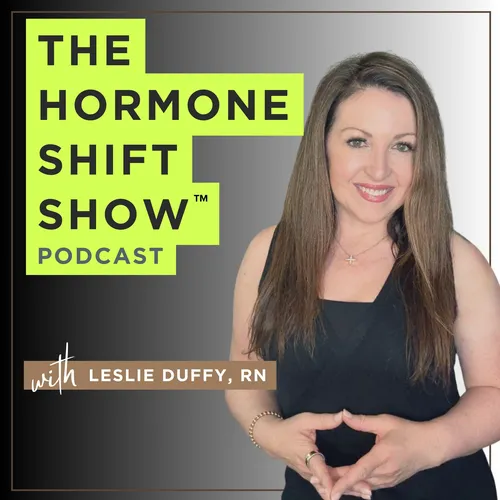6: What Women Over 40 Need to Know About Progesterone
- Author
- Leslie Duffy, RN
- Published
- Thu 11 Sep 2025
- Episode Link
- https://leslieduffycoaching.com/6
“Low progesterone doesn’t just mess with your cycle, it disrupts your sleep, your mood, your energy, and even your immune system.” - Leslie Duffy
If you’ve been dealing with heavy periods, clotting, night sweats, insomnia, anxiety, or even autoimmune flare-ups, it might not just be “getting older.” In perimenopause, progesterone is the first hormone to take a sharp dive, dropping by nearly 75% between the ages of 35 and 50. And when it does, the ripple effects show up everywhere in your body, from your brain to your bones.
Today, I’m breaking down exactly what happens when progesterone declines, why it matters far beyond fertility, and how to tell if your symptoms are connected. You’ll learn the difference between estrogen dominance and low progesterone, the role ovulation plays in producing this calming hormone, and why stress, under-eating, sedentary living, or certain medications may be stealing your progesterone long before age does.
I’ll also walk you through how functional medicine approaches low progesterone by supporting ovulation, reducing stress, addressing thyroid and adrenal health, and using nutrition and lifestyle tools to restore balance. By the end, you’ll understand why progesterone is your body’s built-in calming system, how to protect it, and what steps you can take right now to feel more like yourself again.
---
Your Takeaways
The dramatic decline of progesterone in perimenopause
Low progesterone shows up as anxiety, insomnia, heavy bleeding, and autoimmune flares
Causes of low progesterone include stress, under-eating, infections, poor blood flow, and certain medications
The difference between the conventional medicine and the functional medicine approach
Stress is the ultimate disruptor, and why your body will always choose survival over balance
---
Free Resources
Progesterone & Perimenopause Quick Guide: Get Your Free Guide at https://idyllic-wind-45449.myflodesk.com/episode6
Check out the full show notes at https://leslieduffycoaching.com/6.
---
Articles
GABA System Modifications During Periods of Hormonal Flux Across the Female Lifespan https://www.frontiersin.org/journals/behavioral-neuroscience/articles/10.3389/fnbeh.2022.802530/full
Use of hormone replacement therapy and risk of venous thromboembolism: nested case-control studies using the QResearch and CPRD databases https://www.frontiersin.org/journals/behavioral-neuroscience/articles/10.3389/fnbeh.2022.802530/full
Does taking progesterone pose an increased risk for breast cancer? https://cemcor.ubc.ca/ask/what-about-progesterone-and-risk-breast-cancer/
Risk of Breast Cancer by Type of Menopausal Hormone Therapy: a Case-Control Study among Post-Menopausal Women in France https://pmc.ncbi.nlm.nih.gov/articles/PMC3815310/
---
Connect with Leslie
Connect with me and learn more at LeslieDuffyCoaching.com (https://leslieduffycoaching.com/)
Send me a message and follow me on Instagram @LeslieDuffyCoaching (https://www.instagram.com/leslieduffycoaching/)
Watch the video version of this episode on YouTube @TheHormoneShiftShow (https://www.youtube.com/@TheHormoneShiftShow)
I love hearing from listeners! Email your questions or topic requests to [email protected]
Check out Leslie’s favorite things: Amazon Storefront (https://www.amazon.com/shop/leslieduffycoaching)
